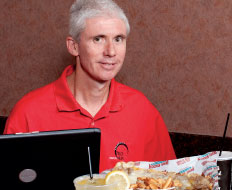Quick-serve leaders have a lot of their plate, whether it’s finding ways to boost the brand’s growth or looking out for all of the people and operators in their care.
Still, for some CEOs, running the company isn’t the only thing they’re concerned about; they’re also focused on making their own units a success. Often starting as an operator and rising through the ranks, many quick-service executives have an extra stake in their brand by serving as a franchisee.
For these executives, finding a way to balance day-to-day responsibilities of the brand as a whole while looking out for their individual units is a constant—though rewarding—battle.
Getting his start as a Papa John’s franchisee, Craig Dunaway later discovered sandwich chain Penn Station East Coast Subs and, along with a few college buddies, became a multiunit franchisee. Soon after, he was asked to serve on Penn Station’s advisory committee, and, years later, he took over as president of the brand.
Dunaway says his dual role as leader and franchisee wouldn’t be possible without the help of trusted business partners. “For anyone with two hats in the ring, I suggest making sure they have someone at the helm of the franchise that knows what they are doing so it doesn’t take time away from the corporate responsibilities,” he says.
Dunaway has 200 people working for his 15 franchise units in Louisville, Kentucky, but he’s also responsible for more than 3,500 employees and 265 locations within the Penn Station system. That’s why he serves more as a consultant for his franchised stores, he says, as he doesn’t want other franchisees to feel like he’s taking time away from them to concentrate on his own locations.
He says having a stake in the brand as a franchisee allows him to think more carefully about the ways in which corporate decisions may affect its operators.
“I think the advantage of being a franchisee is that if the price of potatoes goes up or something happens to the quality of the lettuce, I can feel both sides of the equation,” Dunaway says. “I know exactly what the franchisees are feeling, and I can feel the pain they are feeling on a personal level.”
For example, if Penn Station implements a policy that costs each franchisee 72 cents a day, Dunaway says, he knows how it makes the brand better, but also feels the impact as an owner. As the third-largest franchisee in the company, decisions like these affect him almost five times as much as the average franchisee.
“With the number of units I have, that impacts my bottom line significantly more than most of our franchisees,” he says. “I think that says a lot for my credibility, because they know we wouldn’t be making decisions if it weren’t in the best interest of the brand.”
Lloyd Sugarman, CEO of SoupMan—parent company of soup brand The Original SoupMan—entered the quick-service world as a franchisee in 1986. He now operates 17 Johnny Rockets stores and three Original SoupMan units. He says starting out as an operator helps him identify with his own franchisees.
“Who can understand what really goes on at the street level of the business better than someone who has found the location, raised the money, built the store, tweaked it, and made changes … to help it become more successful?” Sugarman says. “When you see the different types of people who come in and run companies, I think those that come in from the ground level is a good thing.”
Though his son has taken over control of his personal units, Sugarman keeps tabs on their progress by visiting the stores, just as he does with any of the franchisees in the SoupMan system.
“When I took over, I looked at experiences I had and how I could bring that to the table for the company as a whole,” he says. “Every day, I am involved with helping this company find better solutions, and being a franchisee gives me the mindset to understand what works best and what doesn’t.”
Costa Vida CEO Sean Collins and president Dave Rutter were franchisees at the fast-casual Mexican brand for several years before taking on the corporate role. They continue to treat the stores that they operate like franchises; each of those stores pays royalties, and Rutter attends the Utah DMA franchisee co-op each year.
Collins says many of the brand’s executives thought the pair needed to choose between the two roles. However, he says acting as both franchisees and brand leaders allows them to listen closely to operators and let them have a say in strategic planning. “It’s not just lip service. We value very much the input and direction we receive,” he says. “We are currently putting in place a franchise advisory council so we don’t lose touch with the voice of our franchisees.”
Collins and Rutter decided that at least 10 percent of all stores in the system would be owned at the corporate level in order to stay sensitive to the issues and decisions that all franchisees face. The pair has also committed to making the best decisions for the brand as a whole, even if it’s at the expense of the corporate-owned locations.
At one point, for example, the brand brought in a new POS system, despite the fact that it was more costly for the corporate units. “Even if something will affect our corporate stores differently than the franchise stores, we won’t differentiate on any decisions or let that play into the equation,” Collins says. “If you don’t do that, franchisees will see it and you will lose all credibility and your motives will be questioned. You need to think brand first.”













